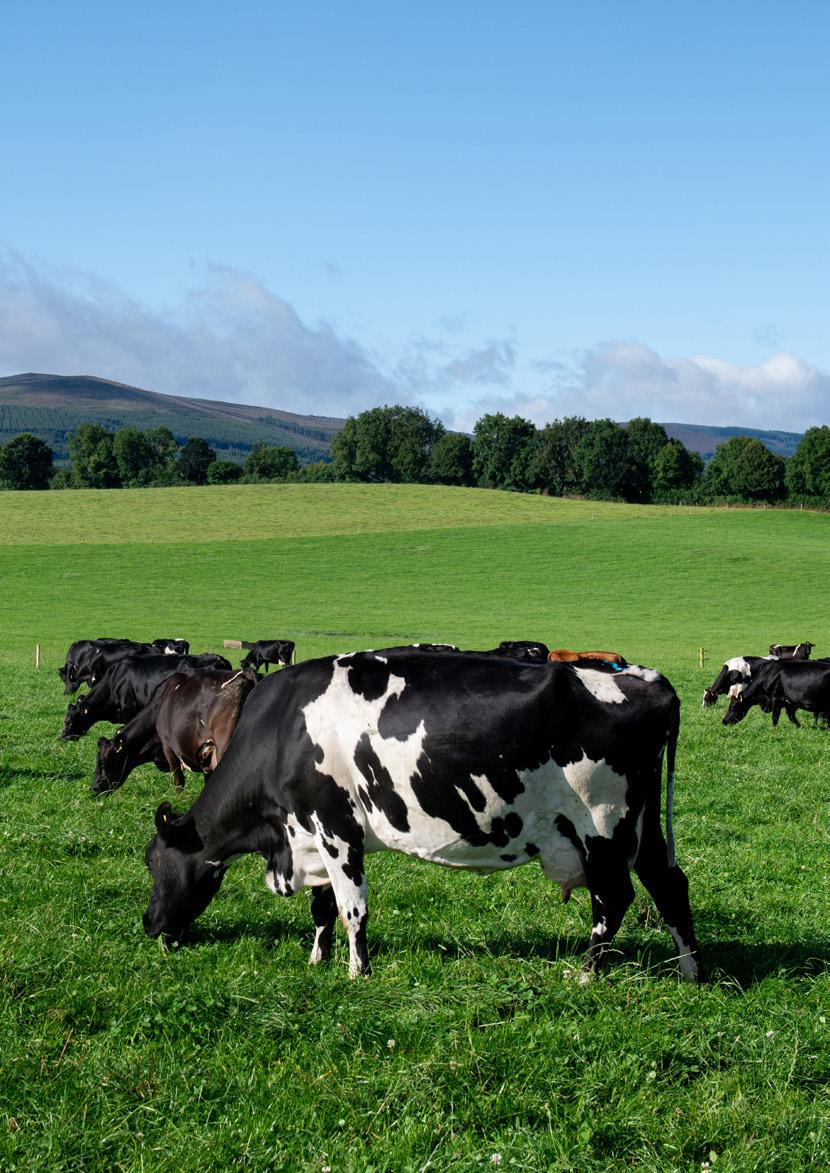

Annual Report 2024
The National Dairy Council protects and promotes the image, quality, taste and nutritional credentials of Irish dairy. It promotes the benefits of the dairy portfolio to the consumer as part of a balanced, healthy lifestyle while also safeguarding the reputation of Ireland’s dairy producers and processors.
You can find out more about the work of the National Dairy Council at www.ndc.ie
Cover photo: Dora Kazmierak
Chairperson’s Statement
Chief Executive’s Review
NDC Reports and Financial Statements
Chairperson’s Statement
Irish dairy exports were valued at an estimated €6.3 billion in 2024, in line with the 2023 performance. More than 1.6m tonnes of product was shipped to over 140 countries across the globe. The biggest market for Ireland’s dairy exports was the EU, which took 38% of our exports (€2.4bn), followed by the UK at 17% (€1.1bn) and the US at 12% (€750m).
Milk collections in Ireland declined for the second consecutive year since the abolishment of milk quotas in 2015, reducing to 8.43 billion litres.
Adverse weather in Spring and Summer 2024 limited grass growth, reducing yield. However, a milder Autumn and Winter resulted in increased production at the end of 2024. Global milk supply slowed by almost 1% when compared to 2023.
SUSTAINABILITY
Ireland’s dairy sector continued to demonstrate its commitment to evidence-based mitigation measures to reduce its environmental impact across water, emissions, biodiversity and habitat. The investment made by Ireland’s dairy farmers in research, technology, knowledge transfer and changes on the ground is yielding results. Across seed, feed, breed and myriad other practices at farm level, the industry focused on better outcomes. The high uptake of Low Emission Slurry Spreading (LESS) technology and the very extensive use of clover in grass reseeded during 2024 is evidence of same.
RETAINING THE NITRATES DEROGATION
Farmers continued to adapt to the regulations introduced in 2023, focusing on responsible grassland management practices that reduces our reliance on artificial nitrogen. The sector is facing real challenges through the impact of the nitrates directive on stocking rates, exacerbated by the limited availability of land to rent, and consequent cost.
Farming for Water, the European Innovation Partnership (EIP) initiative continues to make real progress. This voluntary programme has thousands of dairy farmers, actively engaged and implementing innovative practices including better nutrient management to protect watercourses. Our co-operatives continued to expand their own water quality programmes with a clear focus on evidencebased improvements. It is essential that Ireland retains its nitrates derogation and that the case is made in Europe for Ireland’s distinctive pasture-based system.
CONSUMPTION & AFFORDABILITY
Affordability continued to impact purchase decisions in 2024 and dominated debate in the media. Consumers experienced cost of living challenges across almost all forms of expenditure with many affected by rising mortgages or rents, energy bills as well as inflation in their grocery shopping. The cost of high-quality, increasingly sustainably produced food has long been known to the dairy farmer and is making itself known to the consumer. Evidence suggested that the trend towards plant-based alternatives has waned. Despite the increased cost at the shelf edge, milk has reasserted itself, no doubt due to its nutrition, affordability, palatability, versatility and cultural relevance.
More than 1.6m tonnes of product was shipped to over 140 countries across the globe. The biggest market for Ireland’s dairy exports was the EU, which took 38% of our exports (€2.4bn), followed by the UK at 17% (€1.1bn) and the US at 12% (€750m).
Despite the challenges, it is important that we celebrate the role of Ireland’s dairy farmers in producing worldclass food on a global stage, while reducing our environmental impact.
YEAR AHEAD
2025 is set to see domestic production grow but challenges remain on the global stage. The lack of clarity in relation to US tariffs creates uncertainty, while falling demand in China will have an impact. There is no doubt, however, that Ireland continues to provide a point of difference on the world stage with its high quality, grass-fed and increasingly sustainably produced offering.
Closer to home, the sector continues to grapple with declining numbers of dairy farms and succession challenges. Negative, often ill-informed commentary on the sector is not helpful. Despite the challenges, it is important that we celebrate the role of Ireland’s dairy farmers in producing world-class food on a global stage, while reducing our environmental impact. We must amplify these voices and stories to inspire the next generation of dairy farmers.
NEW LEADERSHIP
Following the departure of CEO Zoë Kavanagh at the beginning of 2024, the board undertook a comprehensive process to identify a successor. Our new CEO, Emma Walls, joined the NDC at the end of the year. With a strong track record in leadership, organisational transformation and communications within the dairy sector, she is well-positioned to address the challenges ahead and advocate for the sector.
Mark Keller led the NDC as Interim CEO for much of 2024. On behalf of the board of directors, I thank him for delivering a strong performance for the organisation.
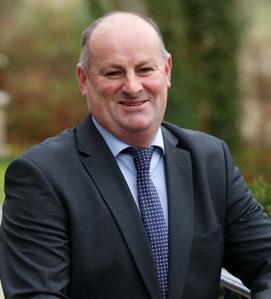
Eamonn Carroll Chairperson
Chief Executive’s Review
2024 was a year of change for the National Dairy Council, bookended by the departure of one CEO and the arrival of another. For much of the year, the organisation was ably led by Mark Keller as Interim CEO, delivering strong results throughout. Mark, and the executive team, are to be commended for working through the challenges and making progress on the organisation’s strategic objectives.
Independently tracked consumer sentiment showed that trust in Irish Dairy Farmers reached an all-time high: 72% of Irish people now trust Ireland’s Dairy Farmers to take care of the environment. Three years earlier, this figure sat at a depressing 47% as negative commentary on the sector abounded in both traditional and new media.
Credit for that enhanced trust must lie with dairy farmers themselves who have worked tirelessly to adopt multiple on-farm practices for the betterment of the environment, with measures across water quality, habitat and biodiversity and emissions – all while navigating the perennial challenges of increased regulation, changeable weather, milk price variability, labour shortages, land availability, fluctuating commodity markets, and an increasing threat of TB infection.
Our dairy farmers consistently show up, do the work and adjust to prevailing circumstances. They are the very definition of resilience.
ADVOCACY
The National Dairy Council team too deserves some credit – for delivering a strong programme of activity throughout the year, shining a light on the work that our farmers are doing and on the quality product that they produce. This work
effectively highlighted not only the benefits to consumers for human nutrition and health, but also the impact on our local communities, our national economy and our global reputation.
THE GRASSROOTS MOVEMENT
The National Dairy Council continued to air its Grass Roots Movement campaign which placed real Irish dairy farmers at the centre of its communications, across TV, streaming platforms, radio, digital audio, print and outdoor media. The adverts speak to the measures undertaken by farmers to solve the climate challenges, evoking the strength of the movement since dairy farmers are ‘thousands strong’.
2024 saw a new focus on digital media with enhanced activity across social platforms and an increased online presence. This included the creation of new 3D brand mascot, Milly. In advertising terms, the use of characters or ‘fluent devices’ help with advertising recall and brand attribution. An independent review of the NDC’s media investment for 2024, by auditors pt78, showed that its campaigns delivered value for money, beating industry benchmarks. The NDC’s campaigns reached 93% of all adults during 2024.
THE FARM AMBASSADOR PROGRAMME
The Grassroots Movement ‘cast’ was recruited from the National Dairy Council’s Farm Ambassador Programme. The programme, which identifies and celebrates individual but representative dairy farmers from across Ireland, was expanded in 2024 with the introduction of new members. This diverse group of farmers represents the best of Irish dairy – from small, family farms with well caredfor cows grazing outdoors for most of the year, where sustainability is top of mind. Each of these farmers has a story to tell – whether it’s exemplary EBI breeding, riparian margins, reed beds, low-emission slurry spreading or attracting biodiversity. These ambassadors have devoted considerable time to share their
72% of Irish people now trust Ireland’s Dairy Farmers to take care of the environment. Three years earlier, this figure sat at a depressing 47% as negative commentary on the sector abounded in both traditional and new media.
During 2024, the NDC commissioned a sub-study as part of the Irish Universities Nutrition Alliance (IUNA) National Teens’ Nutrition Survey. It revealed that only 4% of Irish teens are meeting the Department of Health dietary guidelines to consume five portions of dairy per day.
stories on behalf of the National Dairy Council, speaking at events, appearing in advertising, hosting school visits on farm, or being interviewed in local and national media. They also provide a much-valued sounding board, helping the executive team to understand how best to represent farmers. I am grateful to each and every one of these Farm Ambassadors for the time they commit and the enthusiastic, thoughtful way in which they engage with the programme.
NATIONAL DAIRY COUNCIL TRADEMARK GUARANTEE
The National Dairy Council continued its tradition of working with elite athletes throughout 2024, most notably bringing its Trademark Guarantee partnership with Irish Rugby International, Garry Ringrose, to TV and Radio airwaves and to retail stores nationwide. Coining the phrase, “Nature’s Sports Drink”, the campaign extolled the benefits of fresh milk to rehydrate, refuel and repair thanks to its unique matrix of ingredients, under the supervision of the NDC’s expert nutrition team. The campaign also drew parallels between the commitment, resilience and hard work of athletes and dairy farmers. I am grateful to the Fresh Milk Producers Group for their support for this campaign.
HEALTH & NUTRITION
The Nutrition team continued its programme of bringing evidence-based information and new research to health professionals and consumers, myth-busting some of the more persistent and pernicious misinformation about dairy. This work is yielding positive results. 81% of Irish adults believe that dairy can be part of a sustainable diet, while 82% believe it is part of a balanced diet.
During 2024, the NDC commissioned a substudy as part of the Irish Universities Nutrition Alliance (IUNA) National Teens’ Nutrition Survey. It revealed that only 4% of Irish teens are meeting the Department of Health dietary
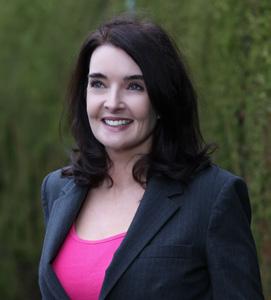
guidelines to consume five portions of dairy per day. The study was discussed at the Nutrition Society Congress 2024 in Belfast and the NDC continued to publicise these concerning findings throughout the year. Other notable work included communications around new research on cow’s milk allergy, communications around bone health and nutrition symposia and events with the Irish Nutrition and Dietetics Institute (INDI); HPX and Sport Ireland Institute.
EUROPEAN MILK FORUM
The National Dairy Council continued to take an active role within the European Milk Forum, a European Economic Interest Group, where learnings are shared, and combined efforts deliver strong, more effective programmes. 2024 saw the launch of the Sustainable Yoghurt programme, an initiative co-funded by the EU and the National Dairy Council to promote the consumption of yoghurt within the EU. By participating in these programmes, the NDC ensures not only that the public gets to hear key messages about dairy, but that funding is secured from the EU to ensure that NDC investment goes further.
SCHOOLS PROGRAMME & EDUCATION
The National Dairy Council continued to deliver the EU School Milk Scheme under its agreement with the Department of Agriculture, Food and the Marine. Fresh milk from Aurivo, Clóna Dairy Products, Lee Strand and Tirlán was supplied to schools across the country during term time. As well as product, the programme delivers educational measures to schools under its Moo Crew platform. 2024 was a busy year for the School Team with numerous initiatives aimed to connect the classroom with the farm, like the MooCrew livestream event from Donal Kavanagh’s farm in Baltinglass in May with Agri Aware; the nationwide Future Farmer competition in June and the NDC’s Webinar to 25,000 students to mark World School Milk Day in September. We are grateful to the Department of Agriculture, Food and the Marine for their support with our schools’ initiatives.
EVENTS AND ACTIVATIONS
2024 was a busy year for activations at the National Dairy Council with consumer events including Bloom and the Sustainable Kitchen Event at Airfield. The NDC’s award winning garden at Bloom showcased dairy production with its meadow and multi-species swards and hosted talks and demonstrations across the five-day event.
The NDC was an active participant at IFJ Dairy Day in Cork and supported Agri Aware’s Open Farm Event at Stephen Byrne’s dairy farm in Monasterevin, where schoolchildren and members of the public got to experience firsthand a working dairy farm.
THE NDC & KERRYGOLD QUALITY MILK AWARDS
The highlight of the events calendar is the annual Quality Milk Awards, won by the outstanding Kennedy family farm outside Cahir, Co Tipperary, nominated by Dairygold Co-Operative Society. In its 15th year, the 2024 Quality Milk Awards had eleven exemplary finalists. Aidan and Derval Kennedy, together with their children, Nickolas and Galina and their farm team, were recognised for excellence and awarded the 2024 NDC & Kerrygold Quality Milk Awards perpetual cup. I express my sincere thanks to all of the co-operatives who nominated farmers and to the indefatigable judges, Dr David Gleeson, Prof Karina Pierce and Prof Patrick Wall. I am particularly grateful to Ornua for their longstanding partnership in this unique celebration of Irish dairy.
THANK YOU
In addition to associate members, Ornua and Fresh Milk Producers mentioned above, I extend my thanks to Progressive Genetics Ltd who continue to support the NDC and to our co-operatives across the country who facilitate our work. My thanks also to the executive team at the NDC for their commitment and hard work and to the board of directors for its support and guidance.
Above all, my thanks to Ireland’s dairy farmers, whose efforts continue to inspire. The story of Irish dairy is one worth telling. Every levy payment is a pledge of faith in the NDC team’s ability to tell that story. Every 0.07c is hard-won by farmers and voluntarily given; we do not take it for granted.

Emma Walls Chief Executive Officer
Above all, my thanks to Ireland’s dairy farmers, whose efforts continue to inspire. The story of Irish dairy is one worth telling. Every levy payment is a pledge of faith in the NDC team’s ability to tell that story. Every 0.07c is hard-won by farmers and voluntarily given; we do not take it for granted.
Strategic Framework
The story of Irish dairy is a story worth telling. It’s the story of vibrant and viable rural communities, a national economy and a global reputation. It’s a story of hard-working, future-focused and resilient small family farms, producing high-quality, nutritious milk in an increasingly sustainable manner. It’s the story of fresh milk transformed into premium products and ingredients that reach 140 countries globally. In Ireland alone, it contributes €17.6 billion to our economy and supports 54,000 jobs.
The National Dairy Council is entrusted to tell the story of Irish Dairy. A not-for-profit representative body, we advocate for Ireland’s dairy farmers amongst the Irish public. It is our job to shine a light on the many measures being taken at farm level to lessen dairy’s environmental impact and to highlight the vital role of dairy in the diet.
Our three strategic priorities are to:
• Advocate for Irish dairy farmers’ social licence to produce milk.
• Celebrate dairy consumption and its role in a healthy, balanced and increasingly sustainable diet.
• Champion milk that is certified as farmed and processed in the Republic of Ireland, accredited by the NDC Trademark Guarantee.
OUR TEAM
We are farmer-funded, farmer-governed and advocate-led.

Our executive team includes expertise in communications and brand-building, education, nutrition, digital activation and, of course, agriculture.
We are insight-led and evidence-based, using science and facts to dispel myths and tackle misinformation around dairy.
We have a deep understanding of consumer behaviour and attitudes and track public sentiment at intervals.
We are experienced storytellers, with the technical knowledge to reach audiences of all demographics across multiple channels in both traditional and digital media.
We are committed, from the ground up.
Farmers’ Social Licence to Produce

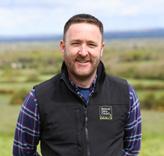

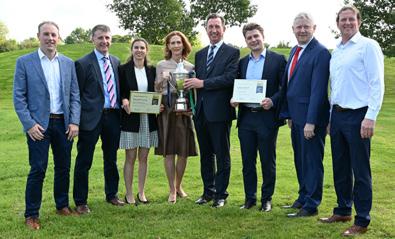

Bord Bia Bloom Panel Discussion (R-L) Noel Meehan, Head of Teagasc Water Quality Knowledge Transfer; Marcus O’Halloran, Executive Director at Agri Aware; Méabh O’Hagan, Signpost Climate Advisor at Teagasc and Majella Mc Cafferty, NDC Farm Advocacy Manager pictured at Bord Bia Bloom where NDC collaborated with Teagasc’s ASSAP programme to inform the public about farm water quality measures, highlighting the sector’s commitment to environmental responsibility.”
Photo: National Dairy Council
NDC Farmer Ambassador Programme
We introduced Paddy O’Kelly, Co. Limerick, James Flaherty, Co. Kerry and Christopher Tuffy from Sligo as the first new farm ambassadors under the updated Farm Ambassador Programme — strong communicators with authentic farming experience who will help lead public engagement efforts.
Photo: Dora Kazmierak (left & centre) Granite Digital (right)
NDC & Kerrygold Quality Milk Awards
The Kennedy farm from Cahir, Co. Tipperary, supplying Dairygold Co-op were announced as the overall winners of the 2024 NDC & Kerrygold Quality Milk Awards.
Pictured L-R are Shane O’Donnell & William Ryan, Dairygold; Galina, Derval, Aidan & Nickolas Kennedy; Billy Cronin & Seán O’Brien, Dairygold.
Photo: Vicky Comerford
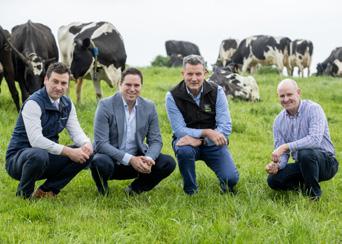
Open Farm Event
NDC supported Agri Aware’s flagship Open Farm event, which took place at Stephen Byrne’s dairy farm in Monasterevin in June. The event saw the addition of a schools’ day on the Friday when guided tours for 450 primary school pupils were organised, a major step in educating children about agriculture and dairy. Pictured at the launch of the event were (L-R): Marcus O’Halloran, Agri Aware; Minister for Agriculture, Food & the Marine, Martin Heydon; Mark Keller, NDC; and Stephen Byrne, host farmer.
Photo: Finbarr O’Rourke
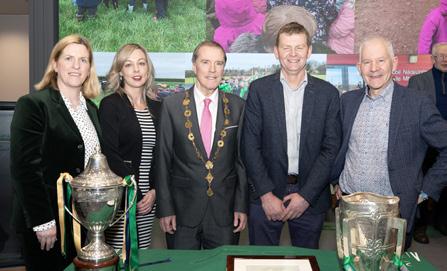

NDC & Kerrygold Quality Milk Awards Forum
Over 200 dairy farmers and stakeholders attended the Teagasc Milk Quality Farm Walk on the farm of John Macnamara, supplier to Kerry Dairy Ireland and 2023 winner of the NDC & Kerrygold Quality Milk Awards. The farm walk was preceded by a forum and panel discussion moderated by Prof. Karina Pierce, UCD.
Photo: Fergal O’Gorman
John Macnamara Mayoral Reception
Pictured at a Mayoral Reception in Limerick to celebrate John Macnamara’s four national farming titles - including 2023 NDC & Kerrygold Quality Milk Awards - were (L-R) Mary Buckley, Communications Director, Kerry Dairy Ireland; Majella Mc Cafferty, NDC Farm Advocacy Manager; Mayor of Limerick, Gerald Mitchell; John Macnamara; and Dr. David Gleeson, Teagasc.
Photo: Liam Burke, Press 22
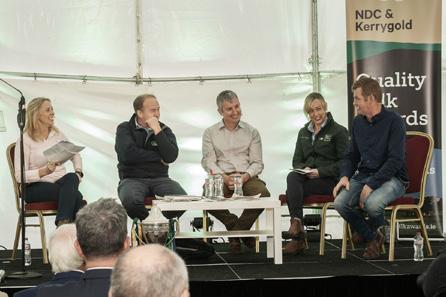
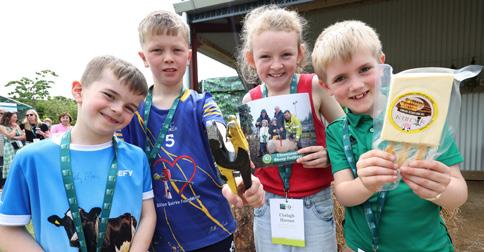
Future Farmer Competition
As part of its commitment to supporting the next generation of dairy leaders, the National Dairy Council hosted the Future Farmer Competition 2024. The competition invited young people to share why they would like to be a Future Farmer. The four winners spoke on a special panel at Bloom about their passion for farming.
Photo: Robbie Reynolds Photography
Reasons to Consume Irish Dairy
NDC Sustainable Kitchen Event Launch
As part of the EU-funded ‘Milk, It’s Good to Know It’s Good’ campaign, NDC hosted ‘The Sustainable Kitchen’ event at Airfield Estate with chefs Anna Haugh, Eric Matthew and Conor Spacey. Guests received a four-course lunch made by Haugh using locally sourced in-season produce.
Photo: Robbie Reynolds Photography
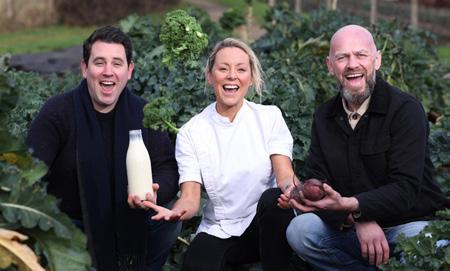

World School Milk Day 2024
NDC hosted a webinar for schools on World School Milk Day, 25th September. The half hour event included an interview with a school participating in the EU School Milk Scheme, an interview with a dairy farmer, a talk from a dietitian and a cooking demonstration. 25,000 kids and their teachers from all over Ireland logged on to the webinar on the day.
Photo: Robbie Reynolds Photography
NDC Trademark Ambassador
NDC continued its partnership with Irish Rugby International Garry Ringrose, promoting nature’s sports drink – milk. In his role as NDC Trademark Guarantee Ambassador, Ringrose reminded consumers that Ireland’s dairy is second to none, thanks to our grass advantage.
Photo: TD Studios

NDC Sponsored Garden
at Bord Bia Bloom 2024
For a third year in a row, the NDC exhibited at Bord Bia Bloom festival in the Phoenix Park.
The garden ‘Nourishing Dairy - From The Ground Up’ was designed as an impactful space forging a deeper connection between Irish consumers and sustainable dairy production. A working kitchen was installed in the garden to host cooking demonstrations, promoting the essential nutritional credentials and great taste of Irish Dairy.
Robbie Reynolds Photography

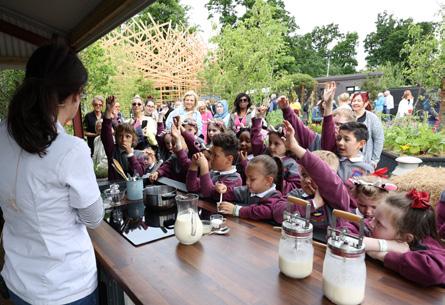
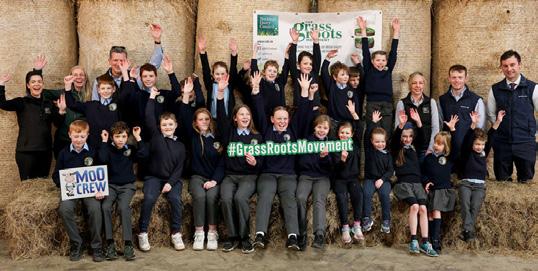
MooTube Livestream Event
The NDC supported Agri Aware in this livestream event which took place on the Kavanagh farm outside Baltinglass. Over 11,000 students registered for the event which featured information on the EU-funded school milk scheme, nutrition and farm advocacy.
Christmas Card Competition
The ‘Deck the Herd’ competition invited children from across the country to showcase their creativity by designing the front of the NDC Christmas card. The competition provided a unique platform for primary school students to celebrate Ireland’s dairy heritage through festive artwork.
Robbie Reynolds Photography

Photo:
Photo: The Social Plug
Photo:

Directors and Other Information
DIRECTORS
Mr. Stephen Arthur
Mr. Eamonn Carroll (Chairperson)
Ms. Ann Fogarty
Mr. Larry Hannon
Mr. Brendan Hinchion
Mr. Patrick O’Keeffe
Mr. Conor Ryan
Mr. Patrick Sheahan
Mr. Denis Drennan
Mr. John O’Connor
Mr. Con Callanan
Mr. Henry Dunne
Mr. Raymond Barlow
Mr. Eamon Mooney
Mr. Stephen Blewitt
SECRETARY
Ms. Emma Walls
REGISTERED OFFICE
Suite 6, The Mall
Beacon Court
Sandyford
Dublin 18
D18 Y640
COMPANY NUMBER
21650
AUDITOR
Deloitte Ireland LLP
Chartered Accountants & Statutory Audit Firm
Deloitte & Touche House
29 Earlsfort Terrace
Dublin 2
BANKERS
AIB
1 Lower Baggot Street
Dublin 2
AIB
St. Helen’s 1 Undershaft
London EC3A BAB
Bank of Ireland
The Plaza
Beacon South Quarter
Dublin 18
D18 F729
SOLICITORS
Gleeson McGrath Baldwin
29 Anglesea Street
Dublin 2
Directors’ Report
The directors present their report on the affairs of the Company, together with the financial statements and auditors’ report, for the financial year ended 31 December 2024.
PRINCIPAL ACTIVITIES
The principal activity of The National Dairy Council (“NDC”) is to support Irish dairy farmers by driving the positive position and consumption of milk and dairy products through integrated marketing and communications programmes, based on informed scientific evidence.
BUSINESS REVIEW AND RESULTS
Income for the financial year amounted to €5,547,138 (2023: €6,265,330). The Company had a loss after taxation totaling €3,054,868 (2023: profit €344,806).
The net current asset position of the Company as at the financial year end amounted to €2,922,973 (2023: net current asset €5,972,426).
The net asset position of the Company as at the financial year end amounted to €2,946,349 (2023: net asset €6,001,217).
The loss for the year arose as a result of a settlement offer made in relation to the ongoing case that was with the Tax Appeals Commission. In January 2025, the Company received a determination from the Tax Appeals Commission in relation to the ongoing engagement with the Revenue Commissioners concerning the appropriateness of VAT inputs claimed by the Company from years ended 31 December 2016 to 2024. The Company has obtained external professional advice on this matter and completed a detailed analysis to apportion input VAT previously claimed. As a result, a settlement offer has been made to the Revenue Commissioners in July 2025. Included in the Income Statement is an exceptional item of €3,759,538, comprising a write down of VAT receivable balance of €2,887,847 and a settlement amount of €871,691 inclusive of interest costs being the Directors’ best estimate of liability but is subject to agreement with the Revenue Commissioners and is uncertain at the date of signing of the financial statements.
FUTURE DEVELOPMENTS
The NDC is the appointed agency working on behalf of dairy farmers to champion the Irish dairy sector ensuring its social license to produce top quality sustainable products endures. The NDC is the authoritative and trusted voice advancing the consumer perception of Irish milk & dairy products while supporting the industry in promoting their consumption.
As part of the NDC’s strategy, it is anticipated that three sources of funding will support the delivery of services to the sector over the coming years. These include: Farmer levy income, EU project income and Dairy businesses who wish to procure NDC services.
PRINCIPAL RISKS AND UNCERTAINTIES
The main risk facing the Company during the financial year and anticipated in future years is the receipt of levy contributions and maintaining sufficient reserves to allow the entity to operate efficiently and effectively and any impact on the Company of final settlement with the Revenue Commissioners on the VAT matter outlined above.
The Company is a member of the EEIG European Milk Forum (EEIG EMF), a grouping set up to promote dairy products throughout Europe. Participation in this group allows the National Dairy Council, among other activities, to apply for EU funding to support its campaigns. Included in the debtor balance at 31 December 2024 is an amount due to be refunded from the EEIG EMF of €702,188. The EEIG EMF is currently the subject of a tax audit covering the 2020 and 2021 fiscal years, which began on January 9, 2023, as the tax authorities in France do not consider that EEIG EMF is subject to VAT. The EEIG EMF have obtained external professional advice on this matter and believe they are more likely than not, to achieve a successful outcome on this issue. As at 31 December 2024 the portion of the EEIG EMF VAT under review which correlates to The National Dairy Council’s participation in
Directors’ Report
Continued
the relevant EU projects in the group amounts to €538,664 (2023 €419,550) no provision has been made for this amount in the financial statements.
DIRECTORS
The directors, who served during the financial year and to the date of this report except as noted, were as follows:
Mr. Stephen Arthur (Resigned 1 August 2025)
Mr. Raymond Barlow (Appointed 1 August 2025)
Mr. Stephen Blewitt
Mr. Keith Boyle (Resigned 13 August 2024)
Mr. Con Callanan
Mr. Eamonn Carroll (Chairperson)
Mr. Jerry Doody (Resigned 24 April 2025)
Mr. Denis Drennan
Mr. Henry Dunne (Appointed 13 August 2024)
Ms. Ann Fogarty (Appointed 24 April 2025)
Mr. Vincent Gorman (Resigned 24 April 2025)
Mr. Larry Hannon
Mr. Eamon Mooney (Appointed 1 August 2025)
Mr. Brendan Hinchion (Appointed 11 February 2025)
Mr. John O’Brien (Resigned 19 June 2025)
Mr. Sean O’Brien (Resigned 11 February 2025)
Mr. John O’Connor
Mr. Patrick O’Keeffe
Mr. Eamon O’Sullivan (Resigned 24 April 2025)
Mr. Conor Ryan
Mr. Patrick Sheahan
SECRETARY
The secretary, who served during the financial year and to the date of this report except as noted, was as follows:
Mr. Mark Keller (Resigned 13 December 2024)
Ms. Emma Walls (Appointed 13 December 2024)
DIRECTORS’ AND SECRETARY’S INTERESTS AND DEBENTURES
The directors and secretary of the Company who held office at 31 December 2024 had no beneficial interest in the Company at 31 December 2024 or at 01 January 2024.
GOING CONCERN
The directors have a reasonable expectation that the company has adequate resources to continue in operational existence for the foreseeable future. Thus they continue to adopt the going concern basis in preparing the annual
financial statements. Further details regarding the adoption of the going concern basis can be found in note 1 to the financial statements.
EVENTS AFTER THE BALANCE SHEET DATE
Details of significant events since the balance sheet date are contained in the note 20 to the financial statements.
POLITICAL CONTRIBUTIONS
There were no political donations made during the financial year.
ACCOUNTING RECORDS
The measures that the directors have taken to secure compliance with the requirements of sections 281 to 285 of the Companies Act 2014 with regard to the keeping of accounting records, are the employment of appropriately qualified accounting personnel and the maintenance of computerised accounting systems. The Company’s accounting records are maintained at the Company’s registered office at Suite 6, The Mall, Beacon Court, Sandyford, Dublin, Ireland.
DIRECTORS’ STATEMENT OF RELEVANT AUDIT INFORMATION
So far as each of the directors in office at the date of approval of the financial statements is aware:
a) There is no relevant audit information of which the Company’s auditors are unaware; and
b) The Directors have taken all the steps that they ought to have taken as directors in order to make themselves aware of any relevant audit information and to establish that the Company’s auditors are aware of that information.
This confirmation is given and should be interpreted in accordance with the provisions of Section 330 of the Companies Act 2014 (as amended).
AUDITORS
The auditors, Deloitte Ireland LLP, continue in office in accordance with Section 383(2) of the Companies Act 2014.
Approved by the Board of Directors and signed on its behalf by:
1 August 2025
Mr Eamonn Carroll (Chairperson) Director
Mr Larry Hannon Director
Directors’ Responsibilities Statement
The directors are responsible for preparing the Directors’ Report and the financial statements in accordance with the Companies Act 2014.
Irish company law requires the directors to prepare financial statements for each financial year. Under the law, the directors have elected to prepare the financial statements in accordance with FRS 102 The Financial Reporting Standard applicable in the UK and Republic of Ireland issued by the Financial Reporting Council (“relevant financial reporting framework”). Under company law, the directors must not approve the financial statements unless they are satisfied that they give a true and fair view of the assets, liabilities and financial position of the Company as at the financial year end date and of the profit or loss of the Company for the financial year and otherwise comply with the Companies Act 2014.
In preparing these financial statements, the directors are required to:
• Select suitable accounting policies for the Company financial statements and then apply them consistently; Make judgements and estimates that are reasonable and prudent;
• State whether the financial statements have been prepared in accordance with the applicable accounting standards, identify those standards, and note the effect and the reasons for any material departure from those standards; and Prepare the financial statements on the going concern basis unless it is inappropriate to presume that the Company will continue in business.
The directors are responsible for ensuring that the Company keeps or causes to be kept adequate accounting records which correctly explain and record the transactions of the Company, enable at any time the assets, liabilities, financial position and profit or loss of the Company to be determined with reasonable accuracy, enable them to ensure that the financial statements and Directors’ Report comply with the Companies Act 2014 and enable the financial statements to be audited.
They are also responsible for safeguarding the assets of the Company and hence for taking reasonable steps for the prevention and detection of fraud and other irregularities .
Independent Auditor’s Report
To the Members of The National Dairy Council.
Report on the audit of the financial statements
Opinion
on the financial statements of The National Dairy Council (the ‘Company’)
In our opinion the Company’s financial statements:
• give a true and fair view of the assets, liabilities and financial position of the company as at 31 December 2024 and of the loss for the financial year then ended; and
• have been properly prepared in accordance with the relevant financial reporting framework and, in particular, with the requirements of the Companies Act 2014.
The financial statements we have audited comprise:
• the Income Statement;
• the Statement of Comprehensive Income;
• the Financial Position; the Statement of Changes in Equity;
• the Statement of Cash Flows; and
• the related notes 1 to 20, including a summary of significant accounting policies as set out in note 1.
The relevant financial reporting framework that has been applied in their preparation is the Companies Act 2014 and FRS 102 ‘The Financial Reporting Standard applicable in the UK and Republic of Ireland’ issued by the Financial Reporting Council (“the relevant financial reporting framework”).
Basis for opinion
We conducted our audit in accordance with International Standards on Auditing (Ireland) (ISAs (Ireland)) and applicable law. Our responsibilities under those standards are described below in the “Auditor’s responsibilities for the audit of the financial statements ” section of our report.
We are independent of the company in accordance with the ethical requirements
that are relevant to our audit of the financial statements in Ireland, including the Ethical Standard issued by the Irish Auditing and Accounting Supervisory Authority (IAASA), and we have fulfilled our other ethical responsibilities in accordance with these requirements. We believe that the audit evidence we have obtained is sufficient and appropriate to provide a basis for our opinion.
Emphasis of matter – Exceptional item
We draw attention to note 4 of the financial statements which explains the company received a determination in January 2025 from the Tax Appeals Commission in relation to Value Added Tax (VAT) inputs previously claimed. As a result of such determination, the company made a settlement offer to the Revenue Commissioners which resulted in a write down of VAT receivable balance of €2,887,847 and a provision for VAT payable balance of €871,691. The amount of €3,759,538 is included as an exceptional item in the Income Statement. This settlement offer is subject to agreement with the Revenue Commissioners and, therefore, an uncertainty exists relating to the acceptance of this settlement offer. Our opinion is not modified in respect of this matter.
Conclusions relating to going concern In auditing the financial statements, we have concluded that the directors’ use of the going concern basis of accounting in the preparation of the financial statements is appropriate.
Based on the work we have performed, we have not identified any material uncertainties relating to events or conditions that, individually or collectively, may cast significant doubt on the company’s ability to continue as a going concern for a period of at least twelve months from when the financial statements are authorised for issue.
Our responsibilities and the responsibilities of the directors with respect to going concern are described in the relevant sections of this report.
Other information
The other information comprises the information included in the Reports and Financial Statements, other than the financial statements and our auditor’s report thereon. The directors are responsible for the other information contained within the Reports and Financial Statements. Our opinion on the financial statements does not cover the other information and, except to the extent otherwise explicitly stated in our report, we do not express any form of assurance conclusion thereon.
Our responsibility is to read the other information and, in doing so, consider whether the other information is materially inconsistent with the financial statements or our knowledge obtained in the audit or otherwise appears to be materially misstated. If we identify such material inconsistencies or apparent material misstatements, we are required to determine whether there is a material misstatement in the financial statements or a material misstatement of the other information. If, based on the work we have performed, we conclude that there is a material misstatement of this other information, we are required to report that fact.
We have nothing to report in this regard.
Responsibilities of directors
As explained more fully in the Directors’ Responsibilities Statement, the directors are responsible for the preparation of the financial statements and for being satisfied that they give a true and fair view and otherwise comply with the Companies Act 2014, and for such internal control as the directors determine is necessary to enable the preparation of financial statements that are free from material misstatement, whether due to fraud or error.
In preparing the financial statements, the directors are responsible for assessing the company’s ability to continue as a going concern,
disclosing, as applicable, matters related to going concern and using the going concern basis of accounting unless the directors either intend to liquidate the company or to cease operations, or have no realistic alternative but to do so.
Auditor’s responsibilities for the audit of the financial statements
Our objectives are to obtain reasonable assurance about whether the financial statements as a whole are free from material misstatement, whether due to fraud or error, and to issue an auditor’s report that includes our opinion. Reasonable assurance is a high level of assurance, but is not a guarantee that an audit conducted in accordance with ISAs (Ireland) will always detect a material misstatement when it exists. Misstatements can arise from fraud or error and are considered material if, individually or in the aggregate, they could reasonably be expected to influence the economic decisions of users taken on the basis of these financial statements.
A further description of our responsibilities for the audit of the financial statements is located on IAASA’s website at: https://iaasa. ie/publications/description-of-the-auditorsresponsibilities-for-the-audit-of-the-financialstatements. This description forms part of our auditor’s report.
Report
on other legal and regulatory requirements
Opinion on other matters prescribed by the Companies Act 2014
Based solely on the work undertaken in the course of the audit, we report that:
• We have obtained all the information and explanations which we consider necessary for the purposes of our audit.
In our opinion the accounting records of the company were sufficient to permit the financial statements to be readily and properly audited.
Independent Auditor’s Report
• The financial statements are in agreement with the accounting records. In our opinion the information given in the directors’ report is consistent with the financial statements.
• In our opinion, those parts of the directors’ report specified for our review, which does not include sustainability reporting when required by Part 28 of the Companies Act 2014, have been prepared in accordance with the Companies Act 2014.
Matters on which we are required to report by exception
Based on the knowledge and understanding of the company and its environment obtained in the course of the audit, we have not identified material misstatements in the directors’ report.
We have nothing to report in respect of the provisions in the Companies Act 2014 which require us to report to you if, in our opinion, the disclosures of directors’ remuneration and transactions specified by law are not made.
Use of our report
This report is made solely to the company’s members, as a body, in accordance with Section 391 of the Companies Act 2014. Our audit work has been undertaken so that we might state to the company’s members those matters we are required to state to them in an auditor’s report and for no other purpose. To the fullest extent permitted by law, we do not accept or assume responsibility to anyone other than the company and the company’s members as a body, for our audit work, for this report, or for the opinions we have formed.

Quay Limerick: Niamh Keating
1 August 2025
Income Statement
For the financial year ended 31 December 2024
All amounts relate to continuing operations. There were no recognised gains and losses for 2024 and 2023 other than those included in the Income Statement.
Statement of Comprehensive Income
For the financial year ended 31 December 2024
Statement of Financial Position
As at 31 December 2024
The financial statements of The National Dairy Council (registered number: 21650) were approved by the Board of Directors and authorised for issue on 1/08/2025. They were signed on its behalf by:
Mr. Eamonn Carroll (Chairperson) Director
Mr. Larry Hannon Director
Statement of Changes in Equity
For the financial year ended 31 December 2024
Statement of Cash Flows
For the financial year ended 31 December
Notes to the Financial Statements
For the financial year ended 31 December 2024
1. ACCOUNTING POLICIES
The principal accounting policies are summarised below. The accounting policies and measurement bases have all been applied consistently throughout the financial year and to the preceding financial year.
General
information and basis of
accounting
The National Dairy Council (registered number 21650) is a company, limited by guarantee, registered in Ireland under the Companies Act 2014. The address of the registered office is Suite 6, The Mall, Beacon Court, Sandyford, Dublin, Ireland. The nature of the Company’s operations and its principal activities are set out in the Directors’ Report.
The financial statements have been prepared under the historical cost convention, modified to include certain items at fair value, and in accordance with the Companies Act 2014 and Financial Reporting Standard 102 (FRS 102) issued by the Financial Reporting Council.
The functional currency of The National Dairy Council is considered to be EUR because that is the currency of the primary economic environment in which the Company operates.
These financial statements are separate financial statements.
Going concern
The company’s business activities, together with the factors likely to affect its future development, performance and position are set out in the directors’ report. The directors have reviewed the company’s position at 31 December 2024 and have reviewed budgets prepared by management including the impact to budgets of the settlement offer with the Revenue Authorities as outlined in Note 4. The directors have a reasonable expectation that the company has adequate resources to continue in operational existence for the foreseeable future. Thus, they continue to
adopt the going concern basis of accounting in preparing the annual financial statements.
Income
Income is comprised of voluntary levies, grant income, sales and interest receivable. Income received in the form of voluntary levy contributions is based on a price per litre of milk produced and is recognised on a receipt’s basis. All other income is credited to income in the period to which it relates.
Taxation
The Company is exempt from Income Taxation in respect of its trading activities. Passive income, if any, (such as deposit interest) remains taxable.
Expenditure
Expenditure is accounted for on an accrual’s basis.
Pension
The Company operates a defined contribution pension scheme. Contributions payable to the scheme are charged to the income and expenditure account in the period to which they relate.
Tangible fixed assets
Tangible fixed assets are stated at cost or valuation, net of depreciation and any provision for impairment. Depreciation is provided on all tangible fixed assets, other than investment property and freehold land, at rates calculated to write off the cost or valuation, less estimated residual value, of each asset on a straight-line or reducing balance basis over its expected useful life, as follows:
Office equipment
4 years straight line
Computer equipment 4 years straight line
Residual value represents the estimated amount which would currently be obtained from disposal of an asset, after deducting
Notes to the Financial Statements
estimated costs of disposal, if the asset were already of the age and in the condition expected at the end of its useful life.
The gain or loss arising on the disposal of an asset is determined as the difference between the sale proceeds and the carrying value of the asset and is credited or charged to profit or loss.
Financial
instruments
Financial assets and financial liabilities are recognised when the Company becomes a party to the contractual provisions of the instrument.
Financial liabilities and equity instruments are classified according to the substance of the contractual arrangements entered into. An equity instrument is any contract that evidences a residual interest in the assets of the Company after deducting all of its liabilities.
Financial assets and liabilities are only offset in the Balance Sheet when, and only when there exists a legally enforceable right to set off the recognised amounts and the Company intends either to settle on a net basis, or to realise the asset and settle the liability simultaneously.
Financial assets and liabilities
All financial assets and liabilities are initially measured at transaction price (including transaction costs), except for those financial assets classified as at fair value through the Income Statement, which are initially measured at fair value (which is normally the transaction price excluding transaction costs), unless the arrangement constitutes a financing transaction. If an arrangement constitutes a financing transaction, the financial asset or financial liability is measured at the present value of the future payments discounted at a market rate of interest for a similar debt instrument.
Financial assets and liabilities are offset in the Statement of Financial Position when, and only when, there exists a legally enforceable right to set off the recognised amounts and the Company intends either to settle on a net basis, or to realise the asset and settle the liability simultaneously.
Financial assets are derecognised when and only when a) the contractual rights to the cash flows from the financial asset expire or are settled, b) the Company transfers to another party substantially all of the risks and rewards of ownership of the financial asset, or c) the Company, despite having retained some, but not all, significant risks and rewards of ownership, has transferred control of the asset to another party.
Financial liabilities are derecognised only when the obligation specified in the contract is discharged, cancelled or expires.
Leases
Operating lease costs are charged to the income statement as incurred.
Exceptional items
Exceptional items are material transactions or events that are unusual in nature and infrequent in occurrence, which merit separate disclosure in the Statement of Profit or Loss to provide a better understanding of the company’s financial performance.
Examples of exceptional items include significant impairments, restructuring costs, profits or losses on disposal of operations, or costs arising from legal settlements. The classification of an item as exceptional is made in accordance with the company’s accounting policies and professional judgement, considering both the nature and the size of the item.
Notes to the Financial Statements
Continued
Exceptional items are disclosed separately on the face of the Income Statement or in the notes to the accounts, with supporting narrative provided where necessary to explain their nature and financial effect.
2. CRITICAL ACCOUNTING JUDGEMENTS AND KEY SOURCES OF ESTIMATION UNCERTAINTY
In the application of the Company’s accounting policies, which are described in note 1, the directors are required to make judgements, estimates and assumptions about the carrying amounts of assets and liabilities that are not readily apparent from other sources. The estimates and associated assumptions are based on historical experience and other factors that are considered to be relevant. Actual results may differ from these estimates.
The estimates and underlying assumptions are reviewed on an ongoing basis. Revisions to accounting estimates are recognised in the financial year in which the estimate is revised if the revision affects only that period, or in the financial year of the revision and future periods if the revision affects both current and future periods.
Critical judgements in applying the Company’s accounting policies
The following are the critical judgements, apart from those involving estimations (which are dealt with separately below), that the directors have made in the process of applying the Company’s accounting policies and that have the most significant effect on the amounts recognized in the financial statements.
Critical judgement - VAT settlement offer
In January 2025, the Company received a determination from the Tax Appeals Commission in relation to the ongoing engagement with the Revenue Commissioners concerning appropriateness of VAT inputs claimed by the Company for years ended
31 December 2016 to 2024. The determination provided that the input VAT incurred should be apportioned between economic and noneconomic activities. The Company has obtained external professional advice on this matter and completed a detailed analysis to apportion input VAT previously claimed. The methodology proposed to apportion input VAT between economic and non-economic activities, has to be agreed with the Revenue Commissioners which could impact the potential liability and related interest costs. The financial statements reflect the Directors’ best estimate of the liability but is subject to agreement with the Revenue Commissioners and is uncertain at the date of signing of financial statements.
Critical judgement – VAT Recoverable
The Company is a member of the EEIG European Milk Forum (EEIG EMF), a grouping set up to promote dairy products throughout Europe. Participation in this group allows the National Dairy Council, among other activities, to apply for EU funding to support its campaigns. Included in the debtor balance at 31 December 2024 is an amount due to be refunded from the EEIG EMF of €702,188. The EEIG EMF is currently the subject of a tax audit covering the 2020 and 2021 fiscal years, which began on January 9, 2023, as the tax authorities in France do not consider that EEIG EMF is subject to VAT. The EEIG EMF have obtained external professional advice on this matter and believe they are more likely than not, to achieve a successful outcome on this issue.
As at 31 December 2024 the portion of the EEIG EMF VAT under review which correlates to The National Dairy Council’s participation in the relevant EU projects in the group amounts to €538,664 (2023 €419,550) no provision has been made for this amount in the financial statements.
Notes to the Financial Statements
3. INCOME
Turnover is derived from its principal activities wholly undertaken in Ireland. An analysis of the Company’s turnover is as follows:
All income, apart from European Union Grant income of €998,164 (2023: €1,359,161) arose in the Republic of Ireland.
4. EXCEPTIONAL ITEM
In January 2025, the Company received a determination from the Tax Appeals Commission in relation to the ongoing engagement with the Revenue Commissioners concerning the appropriateness of VAT inputs claimed by the Company for years ended 31 December 2016 to 2024. The determination provided that the input VAT incurred should be apportioned between economic and non-economic activities whereby the Company had previously claimed a full deduction for input VAT. The Company has obtained external professional advice on this matter and completed a detailed analysis to apportion input VAT previously claimed. As a result, in July 2025 a settlement offer has been made to the Revenue Commissioners. Included in the Income Statement is an exceptional item of €3,759,538, comprising a write down of VAT receivable balance of €2,887,847 and a settlement amount of €871,691 inclusive of interest costs being the Directors’ best estimate of liability but is subject to agreement with the Revenue Commissioners and the acceptance of the settlement offer is uncertain at the date of signing of the financial statements. Refer to note 2 for critical judgement relating to the VAT settlement offer.
Notes to the Financial Statements Continued
5. OPERATING (LOSS)/PROFIT AND (LOSS)/PROFIT ON ORDINARY ACTIVITIES BEFORE TAXATION
Operating profit and profit on ordinary activities before taxation is stated after charging/(crediting):
6. STAFF NUMBER AND COSTS
6. STAFF NUMBER AND COSTS
Continued Their
(note 15)
The number of employees at the financial year ended 31 December 2024, including twelve directors, was 21 (2023: 22).
Aggregate emoluments paid to or receivable by 44,243 44,040 directors in respect of qualifying services
In addition to the remuneration disclosed above, the directors were reimbursed €15,975 (2023: €14,601) for expenses incurred in the provision of their services.
Notes to the Financial Statements
Continued
7. TAX ON (LOSS)/PROFIT ON ORDINARY ACTIVITIES
on (loss)/profit on ordinary activities
Tax reconciliation
The differences between the total tax charge shown above and the amount calculated by applying the standard rate of Irish corporation tax to the profit before taxation is as follows:
The National Dairy Council is chargeable to taxation on bank and other interest.
8. TANGIBLE ASSETS
9. DEBTORS
Notes to the Financial Statements
Continued
10. CASH AND CASH EQUIVALENTS
11. CREDITORS: AMOUNTS FALLING DUE WITHIN ONE YEAR
As outlined in Note 4 included in the VAT balance is the Directors’ best estimate of VAT payable by the Company and reflects settlement offer made to the Revenue Commissioners in July 2025.
Notes to the Financial Statements
12. FINANCIAL INSTRUMENTS
Financial assets
Measured at undiscounted amount receivable
– Other debtors (note 9)
Financial liabilities
Measured at undiscounted amount payable
– Trade creditors (note 11) (125,331) (215,530)
– Other payables (note 11) (2,128) (1,080) (127,459) (216,610)
13. OPERATING LEASES
Total future minimum lease payments under non-cancellable operating leases are as follows:
Notes to the Financial Statements
Continued
14. RESERVES
The Company’s other reserves are as follows:
The profit and loss reserve represents cumulative profits or losses and other adjustments.
15. FINANCIAL COMMITMENTS
Commitments
Guarantees
The Company is a member of the GEIE European Milk Forum, a grouping set up to promote dairy products throughout Europe. The Company, in conjunction with the other nine members of the forum, has provided a guarantee in relation to any commitments of the forum to third parties which remain outstanding following liquidation of the forum.
Disclosure of Bank guarantees
The Company has entered into bank guarantees in the normal course of business. The bank guarantees are required to secure grant funding received in advance from the Department of Agriculture, Food and the Marine. The amount outstanding at the balance sheet date was €280,000 (2023: €Nil).
16. RETIREMENT BENEFIT OBLIGATIONS
Defined contribution schemes:
The Company operates a defined contribution pension scheme. Contributions payable in respect of the financial year ended 31 December 2024 amounted to €62,233 (2023: €51,760). Pension contributions outstanding at the financial year end were €1,600 (2023: €Nil).
Notes to the Financial Statements
17. STATEMENT OF CASH FLOWS
18. CONTINGENCIES
Contingent
liabilities
The Company is in receipt of grant funding in advance from the Department of Agriculture, Food and the Marine in its normal course of business. The amounts received in advance would have to be returned should the Department deem them to be repayable. The amount at the balance sheet date was €179,335 (2023: €302,569).
The Company is a member of the EEIG European Milk Forum (EEIG EMF), a grouping set up to promote dairy products throughout Europe. Participation in this group allows the National Dairy Council, among other activities, to apply for EU funding to support its campaigns. Included in the debtor balance at 31 December 2024 is an amount due to be refunded from the EEIG EMF of €702,188. The EEIG EMF is currently the subject of a tax audit covering the 2020 and 2021 fiscal years, which began on January 9, 2023, as the tax authorities in France do not consider that EEIG EMF is subject to VAT. The EEIG EMF have obtained external professional advice on this matter and believe they are more likely than not, to achieve a successful outcome on this issue. As at 31 December 2024 the portion of the EEIG EMF VAT under review which correlates to The National Dairy Council’s participation in the relevant EU projects in the group amounts to €538,664 (2023: €419,550) no provision has been made for this amount in the financial statements.
Notes to the Financial Statements
19. RELATED PARTY TRANSACTIONS
Certain directors of the Company are also directors of the co-operatives and other companies from which the Company receives voluntary levy income and other income. The total voluntary levy income and other income received in the normal course of business from these co-operatives and companies amounted to €3,752,772 (2023: €4,052,946). The total expenses payable to these co-operatives relating to their participation in the School Milk Scheme programme amounted to €138,951 (2023: €158,518). The amount payable to these co-operatives at the balance sheet date was €39,655 (2023: €60,820) and the amount receivable from these co-operatives and companies at the balance sheet date was €15,215 (2023: €117,805). The total expenses claimed by these directors for the financial year ended 31 December 2024 amounted to €12,555 (2023: €11,191). The directors held 7 meetings during the financial year ended 31 December 2024 (2023: 7 meetings).
Transactions with the entity’s directors (or members of its governing body)
20. EVENTS AFTER THE BALANCE SHEET DATE
As outlined in Note 4, the financial statements reflect the settlement offer made in July 2025 to the Revenue Commissioners, being the Directors’ best estimate of liability but is subject to agreement with the Revenue Commissioners and is uncertain at the date of signing of the financial statements.
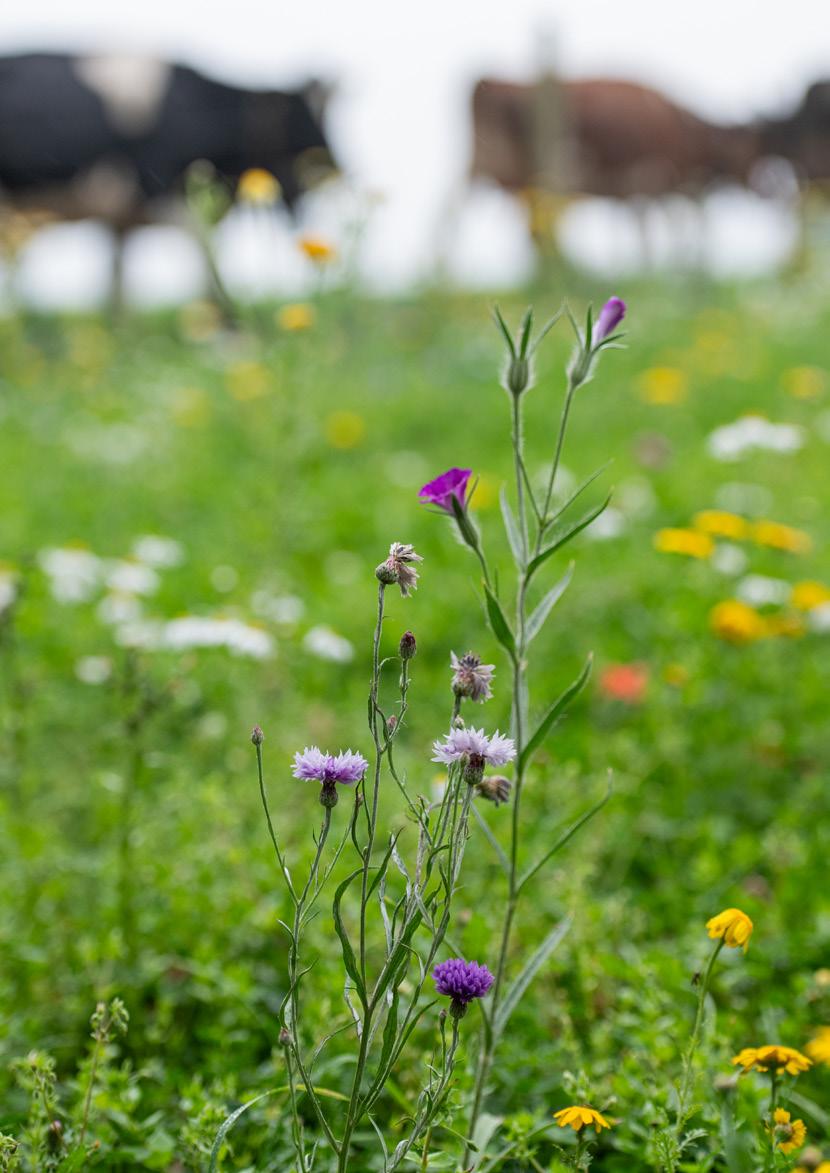
The National Dairy Council wishes to thank its member co-ops and associate members for their continued support, ensuring the long-term success of NDC dairy marketing campaigns and initiatives.
NDC Members
Bainne Codladh Ltd.
Arrabawn Co-operative Society Ltd.
Aurivo Co-operative Society Ltd.
Bandon Co-operative Agricultural & Dairy Society Ltd.
Barryroe Co-operative Ltd.
Boherbue Co-operative Ltd.
Callan Co-operative Agricultural & Dairy Society Ltd.
Centenary Thurles Co-operative Society Ltd.
Clóna Dairy Products Ltd.
Dairygold Co-operative Society Ltd.
Kerry Co-operative Creameries Ltd.
Lee Strand Co-operative Creamery Ltd.
Lisavaird Co-operative Creamery Ltd.
Mullinahone Co-operative Dairy Society Ltd.
North Cork Co-operative Creameries Ltd.
Tirlán Ltd.
Associate Members
Fresh Milk Producers Group
Ornua Co-operative Ltd.
Progressive Genetics Co-operative Society Ltd.

